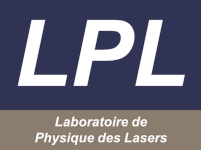Post: Master internship in Experimental Molecular Physics
Location: Laboratoire de Physique des Lasers (LPL), CNRS-Univ Sorbonne Paris Nord, Villetaneuse, France
Team: Metrology, Molecules and Fundamental Tests (MMFT)
Advisors: Dr Benoît Darquié, Dr Mathieu Manceau
Contract: Fixed Term, 4-6 months, starting in Spring 2024
You will find the job description here
Internship description:
The master student will participate in the development of a new-generation molecular clock specifically designed for precision vibrational spectroscopy of cold molecules in the gas phase. The proposed technology is at the forefront of cold molecule research and frequency metrology, and opens possibilities for using polyatomic molecules to perform tests of fundamental physics and explore the limits of the standard model. The apparatus will be used in the first place for measuring the electroweak-interactions-induced tiny energy difference between enantiomers of a chiral molecule, a signature of parity (left-right symmetry) violation, and a sensitive probe of dark matter.
Compared to atoms, molecular systems, owing to their numerous degrees of freedom, offer promising perspectives for improving tests of fundamental physics and precision measurements in general. Molecules are increasingly being used internationally for instance to test fundamental symmetries1, to measure fundamental constants2 or their variation in time3, to search for dark matter4, … Many of these experiments can be cast as measurements of resonance frequencies of molecular transitions highlighting the importance of frequency metrology. They also require advanced manipulation techniques already standard for atoms: individual states addressing, high detection rates, long coherence times, cooling of internal and external degrees of freedom.
The master student will take an active role in various aspects of the initial developments of the experiment which constitute major steps in providing such techniques for molecules.
She/he will:
– set up the mid-IR quantum cascade laser system at 6.4 µm to probe molecular vibrations in this spectral region;
– perform first Doppler and sub-Doppler absorption spectroscopy on cold molecules produced at ~1 K in a novel cold molecule apparatus, with a particular focus on well-chosen promising chiral and achiral organo-metallic species and polycyclic aromatic hydrocarbons.
1Roussy et al, Science 381, 46 (2023). 2Alighanbari et al, Nature 581, 152 (2020). 3Bagdonaite et al, Science 339, 46 (2013). 4Gaul et al, Phys Rev Lett 125, 123004 (2020).
Keywords:
ultra-high resolution vibrational spectroscopy, mid-infrared, frequency metrology, Doppler-free methods, precision measurements, optical frequency comb lasers, quantum cascade lasers, molecular physics, quantum physics, optics and lasers, vacuum techniques, electronics, programming and simulation
Relevant publications from the team:
Fiechter et al, J Phys Chem Lett 13, 42 (2022), Santagata et al, Optica 6, 411 (2019); Cournol et al, Quantum Electron. 49, 288 (2019), arXiv:1912.06054; Tokunaga et al, New J. Phys. 19, 053006 (2017); Argence et al, Nature Photon. 9, 456 (2015), arXiv:1412.2207.
Requirements:
The applicant should be doing its master studies in a relevant area of experimental physics or chemical physics: atomic, molecular and optical physics, spectroscopy, lasers, quantum optics. Interested applicants should email a CV, a brief description of research interests and the contact details of 2 referents to B. Darquié and/or M.Manceau.
Possibility of continuing with a thesis, funding is already secured
